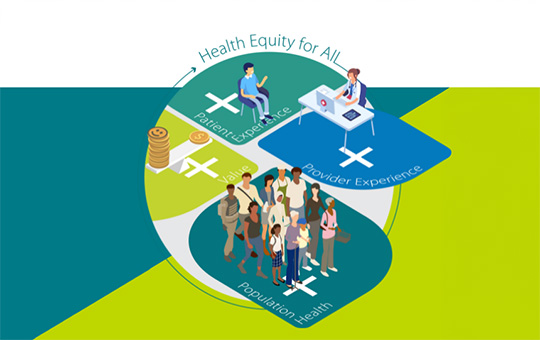End-of-Grant Policy Research Roundtable: Summary Report
Overview
On October 29-30, 2024, CIHR's Institute of Health Services and Policy Research (IHSPR) and partners hosted an end-of-grant Policy Research Roundtable to convene the 60 funded research teams of the Policy Research for Health System Transformation funding program. This brief report summarizes the program aims, funded research projects and results, and roundtable discussions. It includes a "Top 12" tips and insights from the roundtable panel discussions focused on maximizing the value and impact of research for policy.
The Policy Research for Health System Transformation Program
The goal of the funding program was to generate relevant and timely evidence to inform policies to support high-performing health care and public health systems in Canada with the aim of advancing the Quadruple Aim and health equity (now referred to as the Quintuple Aim). Each of the policy research projects addressed a high-priority health system challenge and was informed by diverse disciplines and perspectives. The projects – led jointly by a researcher, policymaker, and knowledge user with relevant lived experience (e.g., a patient partner, community members, caregiver, healthcare provider) – aimed to provide policymakers with timely, relevant, contextualized evidence and policy options to improve health care and public health systems in Canada. The projects used a three-phased knowledge mobilization approach that included a policy dialogue to discuss and contextualize the evidence, co-creation of practical policy options, and an end-of-grant Policy Brief to communicate their evidence and policy options. Additionally, a cross-team Knowledge Mobilization Synthesis Project (KMSP) was funded to generate program-level learnings across the 60 projects regarding the policy issues studied, the research approaches used, and the contextual factors that enhance or hinder evidence uptake. Projects were funded for one year and commenced in March 2023.
The Policy Research for Health System Transformation funding program was led by CIHR-IHSPR in collaboration with the CIHR Institute of Cancer Research (ICR), Institute of Population and Public Health (IPPH), Institute of Circulatory and Respiratory Health (ICRH), Institute of Gender and Health (IGH), Institute of Immunity and Infection (III), the Centre for Research on Pandemic Preparedness and Health Emergencies (CRPPHE), the Strategy for Patient-Oriented Research (SPOR), and the Fonds de recherche du Québec – Santé (FRQS), the Ontario Ministry of Health (MOH), Research NB, and Saskatchewan Health Research Foundation (SHRF). Program partners collectively invested $9 million to fund the program. The Minister of Health announced the program and investment in June 2023 (read the Minister's announcement here).
The End-of-Grant Policy Research Roundtable
The purpose of the end-of-grant Policy Research Roundtable was to convene the funded policy research teams, program partners, and invited guests to:
- Celebrate and showcase the 60 funded health policy research projects.
- Share and learn from each other's health policy research and cross-team KMSP.
- Identify strategies for engaging with policymakers and advancing evidence-informed policymaking.
- Provide a forum for knowledge exchange that sparks connections and collaborations and advances the reach and impact of the research.
In addition to the 60 policy research and KMSP teams presenting their research findings, the roundtable included an open dialogue with panelists who shared their perspectives on evidence-informed primary health care transformation, small breakout discussions on maximizing the impact of research and collaborations to inform policy, and a closing fireside chat with current and former policy leaders about the policy process and maximizing research value. The roundtable agenda is available here.
Research Findings and Evidence-Informed Policy Options
Over the two-day roundtable, the 60 policy research teams presented their research and evidence-informed policy options. Their presentations were organized according to key health policy issues including health workforce planning and development, workforce support and retention, primary health care, long-term care, pandemic resilience and recovery, integrated care, health systems and policies, public health systems research, and patient-oriented health services and policies. A summary of each research project and its policy options and implications is available in a two-page policy brief, contained with the program's Policy Brief Package.
Maximizing the Value and Impact of Research for Policy: Top Insights from the Panels

The opening panel focused on evidence-informed primary health care transformation and opportunities to enhance the value and impact of research. The panelists included Brenda Andreas (Community member | IHSPR Institute Advisory Board member), Dr. Tara Kiran (Fidani Chair in Improvement and Innovation. University of Toronto | Vice-Chair, Quality and Innovation, Department of Family and Community Medicine | Family Physician, St. Michael's Hospital), Stephen Samis (Associate Scientific Director, O'Brien Institute of Public Health, University of Calgary | Former Deputy Minister of Health and Social Services, Government of Yukon) and Frederico Guanais (Deputy Head, Health Division, Organisation for Economic Cooperation and Development). The closing fireside chat continued this theme, unpacking the policymaking process and providing a deeper exploration of the role, value, and opportunities for research evidence to inform policy development and implementation. The panelists included Deb Matthews (Senior Fellow, Dalla Lana School of Public Health | Former Minister of Health, Ontario), Elizabeth Toller (Director General, Health Care Strategies, Health Canada), and Stephen Samis (Associate Scientific Director, O'Brien Institute of Public Health, University of Calgary | Former Deputy Minister of Health and Social Services, Government of Yukon).
Across both panels, strategies to maximize the value and impact of research was a dominant theme. Panelists insights and ideas can be distilled into four themes and 12 key points:
Develop Relationships
- "Relationships are your best asset." Relationships and trust are critical. Develop relationships with government officials, political staff, members of parliament, and at all levels. Build them, nurture them, sustain them.
- "Nothing about me without me." Engage patients, the public, and community members. Co-create evidence and policy with those impacted by policy ("policy impacts everyone, but not everyone has a say in how policy is created, implemented and evaluated"). Commit to diversity and inclusivity in collaborations, understanding each other's perspectives, and valuing diversity of thoughts, beliefs, and experiences. Learn more – read Brenda Andreas' summary reflections of the roundtable here.
Learn the Policy Context and Process
- Know the context. Evidence is one aspect of policymaking, joined by politics and power, ideology, and vested interests. Evidence takes many forms (research, environmental scan, lived experience, public opinion) and is increasingly contextualized when it is considered in the context of political, fiscal, and other factors like values that shape and influence policy.
- Understand the process. There are several points in the policy process where evidence may be used, including issue identification (what is the problem we're trying to solve), gaps and challenges, possible solutions, design of policy options, implementation strategies, and policy evaluation.
- Learn the who's who of your domain. Learn who makes policy and who influences policy (org charts of ministries and premier's offices can be helpful).
Communicate Strategically
- Brevity is key. Be clear, concise, and strategic when communicating evidence. Tailor and distill the message to what policy leaders need to know (the so what – what does it matter, to whom, and what difference will it make?).
- Communicate in the language of a policymaker. Consider policy briefs to synthesize and roll up the evidence and succinctly outline the policy options. Keep policy briefs as short as possible. Do not end a policy brief with "more research is required."
- Don't miss windows of opportunity for influence and impact. Get comfortable providing evidence-informed recommendations amidst evidence gaps. Don't miss a window of opportunity while perfecting the research (weaker, less rigorous research may influence policy in the interim). Consider sharing key results with policymakers in advance of a scientific publication. Policy won't wait.
- Engage with the public. Use social media and lay communication strategies to engage the public. Engage the media to bring attention to underrepresented issues that may not align with existing power structures and priorities. Consider working with communications experts/organizations to help package the evidence, build public awareness, and communicate with government.
Be Patient and Opportunistic
- Think ahead. Be cognizant of the political, social, economic context. Use this awareness to think forward about issues and challenges on the horizon and be ready to move fast.
- Be proactive. Do not wait to be asked for your evidence or policy brief. Develop it. Reach out. Be proactive.
- "Evidence to policy is rarely a linear process." Harness windows of opportunity (they often open when least expected) and be ready with research and policy options when the window opens.
In summary, panelists shared that evidence is critically needed to guide factual, non-partisan, impartial advice to policymakers. Panelists emphasized relationships, early and frequent engagement with policymakers, being ready with evidence (even if it imperfect or incomplete – "some evidence is better than no evidence as policy doesn't wait for research"), brief and concise communications, and persistence and resilience in the important work for better systems and care for people and communities.
Learning Across Policy Research Teams
Roundtable participants engaged in small group breakout discussions to explore three key themes that policy research teams identified as important for discussion and shared learning. The three key themes were: 1) Building meaningful and sustainable collaborations with policy makers; 2) Maximizing the value of research to inform policy; and 3) The methodological approaches that best support rigorous, collaborative, impactful health policy research. A rapid-fire report back enabled sharing of key discussion points across groups.
Conclusion
CIHR-IHSPR shares sincere thanks with all who participated in the Policy Research for Health System Transformation End-of-Grant Policy Research Roundtable. CIHR-IHSPR is grateful to its partners, speakers, presenters, moderators, and facilitators who generously shared their time and expertise and whose involvement enriched the success of the roundtable.
For more information, visit CIHR's Institute of Health Services and Policy Research.
- Date modified:
